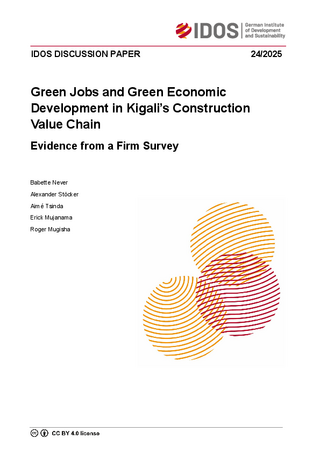Green jobs and green economic development in Kigali’s construction value chain: evidence from a firm survey
Never, Babette / Alexander Stöcker / Aimé Tsinda / Erick Mujanama / Roger MugishaDiscussion Paper (24/2025)
Bonn: German Institute of Development and Sustainability (IDOS)
ISBN: 978-3-96021-269-0
DOI: https://doi.org/10.23661/idp24.2025
Green, circular buildings and their construction are essential for climate change mitigation and resource efficiency. However, the impact of a systematic shift towards green, circular buildings on employment in Sub-Saharan Africa remains unclear. Rwanda, particularly Kigali, is a relevant case due to its high urbanisation rate, pressing housing needs and political commitment to greening the economy. Currently, we do not know what types of green jobs exist in Kigali’s construction value chain or what potential they have for economic development. This paper addresses these questions using a sequential mixed-methods approach. We conducted 33 qualitative, semi-structured interviews with local experts and stakeholders. Based on these insights, we ran a survey with 546 firms across five construction value chain segments: planners/architects, material producers, material and equipment suppliers, construction/masonry firms, and firms installing energy, water, and wastewater technologies. Our analysis reveals four key findings: (1) a significant number of green jobs exist in the construction value chain, with varying degrees of greenness based on the number of environmentally-friendly practices performed (about are 5 per cent highly green and 58 per cent are partly green); (2) diverse green and circular practices are developing through both state support and grassroots initiatives; (3) greening is positively and significantly correlated with employment growth for highly green firms; and (4) greening is positively and significantly associated with improved job quality for all firms. For policy-makers, our results suggest that supporting firms in critical transition phases – those that have initiated greening but are not fully engaged – may enhance both job quantity and quality in the short to mid-term. Expanding green and circular, bio-based building practices across the construction sector requires a mix of interventions focused on cost competitiveness, skills and attitudes.
Dr Aimé Tsinda is Associate Professor, College of Science and Technology, at the University of Rwanda.
Erick Mujanama is a consultant at Equilibria Ltd., Rwanda.
Roger Mugisha is a consultant at Equilibria Ltd., Rwanda.



